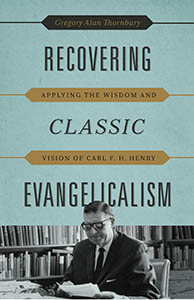About the Author
Gregory Alan Thornbury (Ph.D., The Southern Baptist Theological Seminary) was, at the time of writing, dean of the School of Theology and Missions, vice president for spiritual life, and professor of philosophy at Union University, Jackson, Tennessee. Currently he is the president of The King’s College in New York City.
Overview
Thornbury’s stated goal in this book is to advocate Carl F. H. Henry’s religious epistemology, to encourage evangelicals to make use of it in their cultural engagement, and to defend Henry against his critics. Henry, once an authoritative voice in evangelicalism, stood as theologian behind evangelists like Billy Graham and Francis Schaeffer. Yet he is largely unknown amongst newer evangelicals. If evangelicals are concerned about the public square and engaging culture, Henry’s legacy should be embraced. Thornbury argues that this generation of evangelicals, and (it might be added) especially those of the so-called Young, Restless, Reformed, should turn to Henry, specifically his God, Revelation, and Authority, as a first step towards such embrace.
As the chapter titles each indicate, Thornbury believes that epistemology, theology, inerrancy, culture, and evangelicalism matter. To each, Henry points the way to a thoughtful, biblically grounded, and theologically robust engagement. Thornbury summarizes Henry’s contributions to each in accessible language, framing the larger philosophical and theological issues, and gives an assessment that largely favors Henry’s various perspectives.
Thornbury summarizes his intent:
“In this volume, I intend to reengage Henry as a theorist of classic evangelicalism unapologetically through the lens of key texts in his written corpus” (p. 33).
Table of Contents
Preface
- The Lost World of Classic Evangelicalism
- Epistemology Matters
- Theology Matters
- Inerrancy Matters
- Culture Matters
- Evangelicalism Matters
Selected Bibliography of Works by Carl F. H. Henry
General Index
Scripture Index
Summary
Chapter 1 The Lost World of Classic Evangelicalism
Thornbury opens the book expressing the debt that he owes to Henry. As a college student he struggled with his faith due to challenges brought by the historical-critical method. At his father’s suggestion, Thornbury read God, Revelation and Authority, which salvaged his faith. As such, Thornbury says, “I am no unbiased bystander or scholar of the Henry corpus.” Rather, he wants evangelicalism to return to the “world of Henry.”
Evangelicalism: A Suicide Death Cult
Evangelicals constantly second-guess and self-editorialize themselves. They evaluate and make changes, which is a “Christian virtue.” Yet there is a tendency for evangelicals to …
[To continue reading this summary, please see below....]The remainder of this article is premium content. Become a member to continue reading.
Already have an account? Sign In
Buy the books

Recovering Classic Evangelicalism: Applying The Wisdom And Vision Of Carl F. H. Henry